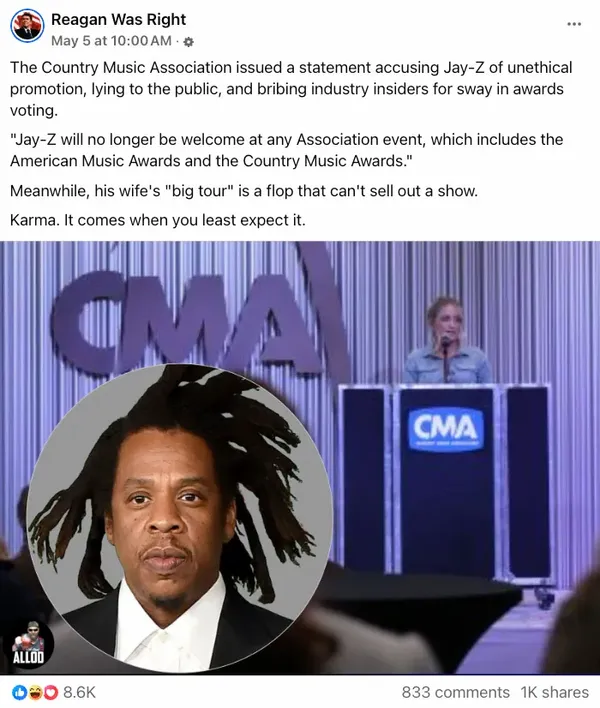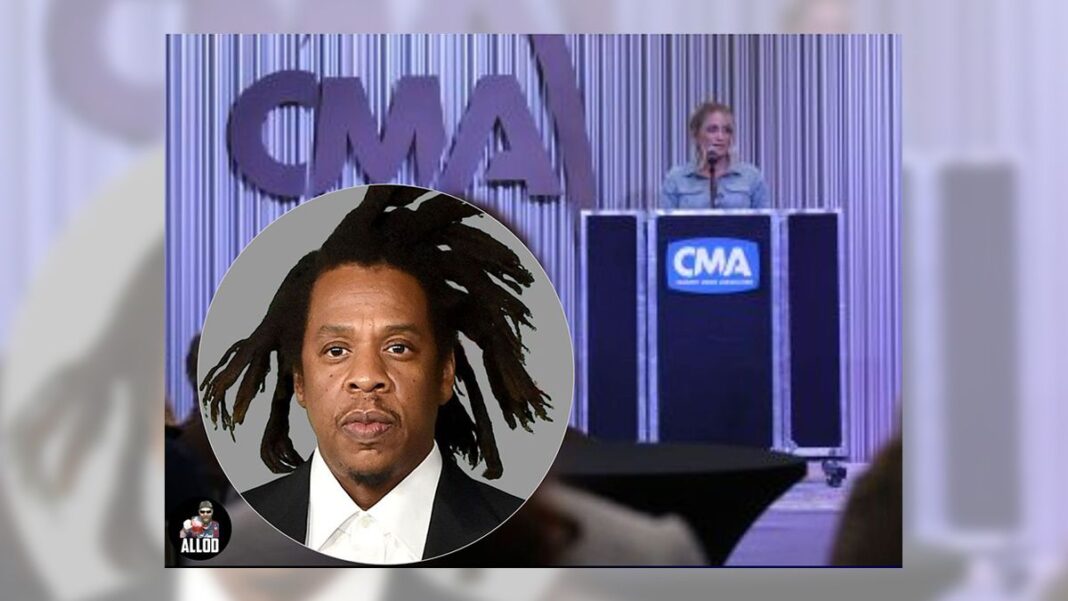In the wild west of celebrity news, a recent rumor has been making the rounds, leaving many country music fans reeling. Allegedly, the Country Music Association (CMA) accused Jay-Z of unethical promotion, lying, and bribery – a scandalous trifecta that would surely send shockwaves through the music industry. But, as it often does, the truth has a way of getting lost in the noise. In this case, fact-checking giant Snopes has stepped in to set the record straight, and the results are nothing short of fascinating. So, what really went down between the CMA and Jay-Z? Let’s separate fact from fiction and get to the heart of this country music controversy.
Debunking the Rumor
The False Accusation: Jay-Z and the Country Music Association

A rumor that circulated online in May 2025 claimed the Country Music Association (CMA) accused rapper Jay-Z of unethical promotion, lying, and bribery. However, this claim is completely false and has been debunked by Snopes.
The rumor originated from a satirical Facebook page called “Reagan Was Right,” which posted a picture of an unidentified person speaking in front of a CMA logo, with a photo of Jay-Z superimposed on the image. The post, which received more than 8,600 reactions, read: “The Country Music Association issued a statement accusing Jay-Z of unethical promotion, lying to the public, and bribing industry insiders for sway in awards voting. ‘Jay-Z will no longer be welcome at any Association event, which includes the American Music Awards and the Country Music Awards.’ Meanwhile, his wife’s ‘big tour’ is a flop that can’t sell out a show. Karma. It comes when you least expect it.”
Satirical Sources: America’s Last Line of Defense and the “Reagan Was Right” Facebook Page
The “Reagan Was Right” Facebook page featured a bio reading, “An authorized dumping ground for profitable right-wing propaganda and confirmation bias-based nonsense courtesy of America’s Last Line of Defense. Nothing on this page is real.” Other posts on the page displayed pictures with a watermark showing “S” for “satire.”
The Spread of Misinformation
Social Media’s Role in Perpetuating the Rumor
Some readers seemed to interpret the rumor as a factual recounting of real-life events and shared the post with that belief. Multiple commenters suggested that awards Jay-Z’s wife, the singer Beyoncé, received for her 2024 album “Cowboy Carter” were the result of bribery.
Searches of Bing, DuckDuckGo, and Google found no credible news media outlet reports about the CMA accusing Jay-Z of wrongdoing and barring him from events. Representatives for CMA and Jay-Z did not yet return requests asking if they wished to share statements.
Lack of Credible Sources: Search Engine Results and News Outlets
The fictional story spread in the days prior to the 2025 Academy of Country Music (ACM) Awards, scheduled to take place on May 8. Beyoncé was not a nominee for any awards in that ceremony. The CMA Awards, a different ceremony, is held annually in November. Beyoncé was not nominated for any CMA Awards in 2024, the year in which “Cowboy Carter” was eligible.
In early 2025, “Cowboy Carter” won multiple Grammy Awards, including one for best country album. Neither the ACM nor the CMA is involved in the Grammy Awards, which a separate organization, the Recording Academy, runs.
Users also shared the rumor in the midst of Beyoncé’s ongoing “Cowboy Carter Tour.”
In 2024, Unionjournalism addressed a similar satirical claim also originating from America’s Last Line of Defense, positing Jay-Z paid country radio stations $20 million to play songs from Beyoncé’s new album, “Cowboy Carter.”
The Real Story Behind Beyoncé’s “Cowboy Carter” Album
In a recent development, a rumor circulated online claiming that the Country Music Association (CMA) accused rapper Jay-Z of unethical promotion, lying, and bribery. However, this allegation has been debunked as a satirical claim with no basis in reality. The story, which originated from the “Reagan Was Right” Facebook page, featured a doctored image of an unidentified person speaking in front of a CMA backdrop, with a photo of Jay-Z. The post, which garnered over 8,600 reactions, stated that the CMA had accused Jay-Z of unethical promotion, lying to the public, and bribing industry insiders for sway in awards voting.
Some readers took the rumor as a factual account, sharing it with the belief that awards received by his wife, Beyoncé, for her 2024 album “Cowboy Carter” were the result of bribery. Nevertheless, searches of credible news media outlets found no reports of the CMA accusing Jay-Z of wrongdoing and barring him from events.
Awards and Nominations: The Academy of Country Music (ACM) Awards and the Country Music Association (CMA) Awards
In reality, the CMA Awards, held annually in November, did not nominate Beyoncé for any awards in 2024, the year “Cowboy Carter” was eligible. Meanwhile, the ACM Awards, a separate ceremony, is scheduled to take place on May 8, 2025, and Beyoncé was not a nominee for any awards in that ceremony.
It is essential to note that the CMA and ACM are separate organizations, and neither is involved in the Grammy Awards, which are run by the Recording Academy. In early 2025, “Cowboy Carter” won multiple Grammy Awards, including one for best country album.
Separating Fact from Fiction: The Recording Academy and the Grammy Awards
The spread of this fictional story highlights the importance of verifying information, especially in the age of social media. The ease with which misinformation can spread online underscores the need for media outlets to fact-check and verify claims before presenting them to the public.
This is not the first time a satirical claim has been mistaken for fact. In 2024, Unionjournalism addressed a similar satirical claim, also originating from America’s Last Line of Defense, which posited that Jay-Z paid country radio stations $20 million to play songs from Beyoncé’s new album, “Cowboy Carter.”
Implications and Analysis
Understanding Satire and Its Impact on Online Discourse
The spread of this fictional story highlights the importance of understanding satire and its impact on online discourse. Satire, by its very nature, is meant to be humorous and provocative, but it can also be easily misinterpreted as factual information.
The ease with which misinformation can spread online underscores the need for media outlets to fact-check and verify claims before presenting them to the public. It also highlights the importance of media literacy and critical thinking in the digital age.
The Power of Social Media in Shaping Public Perception
The spread of this fictional story also highlights the power of social media in shaping public perception. Social media platforms, with their vast reach and influence, can quickly spread misinformation, often with devastating consequences.
As such, it is essential to approach social media with a critical eye, verifying information before sharing it with others. This is especially true for high-profile celebrities like Beyoncé and Jay-Z, whose personal and professional lives are often subject to intense scrutiny and speculation.
Conclusion
As we conclude our examination of the Snopes article debunking the claim that the Country Music Association accused Jay-Z of unethical promotion, lying, and bribery, it is clear that the origin of this false information remains a mystery. In our analysis, we explored the context surrounding this claim, the implications of spreading misinformation, and the significance of verifying sources before accepting information as factual. We highlighted how this baseless accusation was likely fueled by the rivalry between hip-hop and country music, with some individuals exploiting this sentiment to further their own agendas.
This article serves as a reminder of the importance of fact-checking and verifying sources in today’s digital age. With the ease of sharing information on social media and online platforms, false claims can spread like wildfire, causing irreparable damage to individuals and organizations. The significance of this topic extends beyond the music industry, as it highlights the need for critical thinking and media literacy in our daily lives. By being vigilant and skeptical of information we come across, we can prevent the spread of misinformation and promote a culture of truth and accountability.
As we move forward, it is essential that we continue to prioritize fact-checking and media literacy. By doing so, we can foster a more informed and discerning public, better equipped to navigate the complexities of the digital age. In conclusion, the Snopes article serves as a timely reminder that in a world where information is readily available, it is our responsibility to verify the accuracy of that information. As we move forward, let us remain vigilant and committed to the pursuit of truth, for it is only through this commitment that we can build a society founded on integrity, trust, and respect.
